
Indonesian law affecting Chinese-Indonesians were conducted through a series of laws, directives, or constitutions enacted by the Government of Indonesia that affected the lives of Chinese Indonesians or Chinese nationals living in Indonesia since the nation's independence. The laws were made against Chinese Indonesians. Most of these laws are revoked following Reformation era under president Abdurrahman Wahid.
Antara is an Indonesian news agency organized as a statutory corporation. It is the country's national news agency, supplying news reports to many domestic media organizations. It is the only organization authorized to distribute news materials created by foreign news agencies.
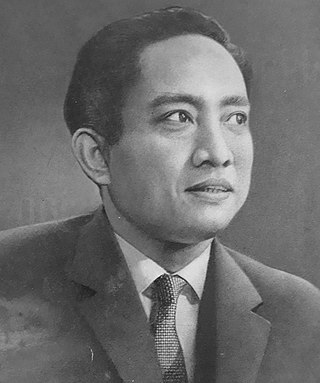
Dipa Nusantara Aidit was an Indonesian communist politician, who served as General Secretary of the Communist Party of Indonesia (PKI) from 1951 until his summary execution during the mass killings of 1965–66. Born on Belitung Island, he was nicknamed "Amat".

Goenawan Mohamad is an Indonesian poet, essayist, playwright and editor. He is the founder and editor of the Indonesian magazine Tempo. Mohamad is a vocal critic of the Indonesian government, and his magazine was periodically shut down due to its criticisms.

Ayu Utami is an Indonesian writer who has written novels, short-stories, and articles. Saman (1998) is widely considered her masterpiece. It was translated into English by Pamela Allen in 2005. By writing about sex and politics, Utami addressed issues formerly forbidden to Indonesian women, a change referred to as sastra wangi.

The Jakarta Post is a daily English-language newspaper in Indonesia. The paper is owned by PT Bina Media Tenggara and based in the nation's capital, Jakarta.
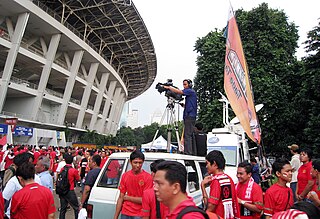
The mass media in Indonesia consist of several different types of communications media: television, radio, cinema, newspapers, magazines, and Internet-based websites.
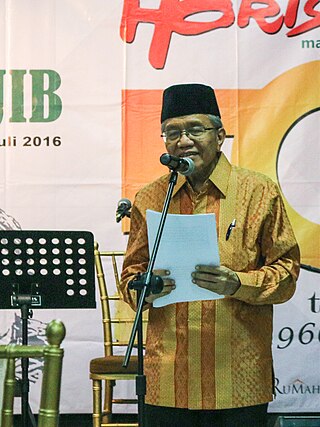
Taufiq Ismail is an Indonesian poet, activist and the editor of the monthly literary magazine Horison. Ismail figured prominently in Indonesian literature of the post-Sukarno period and is considered one of the pioneers of the "Generation of '66". He completed his education at the University of Indonesia. Before becoming active as a writer, he taught at the Institut Pertanian Bogor. In 1963, he signed the "Cultural Manifesto" as a document that opposed linking art to politics. This cost him his teaching position at the Institut.

Lukman Njoto or Njoto was a senior national leader of the Communist Party of Indonesia (PKI), who joined the party shortly after the country's declaration of independence, and was killed following the 1965 coup attempt.

Harmoko, colloquially referred to as Bung Harmoko, was an Indonesian politician and journalist who was active during the New Order era. He served as the Speaker of the People's Representative Council from 1997 until 1999, and was a factor in president Suharto's resignation during the widespread student demonstrations which occurred at the end of the New Order.
The Alliance of Independent Journalists is an Indonesian organization that promotes press freedom in the country.
Ahmad Taufik ; was an Indonesian newspaper journalist known for his articles critical of the dictatorship of President Suharto.
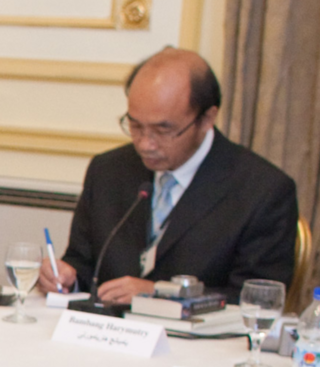
Bambang Harymurti, commonly referred to by his initials BHM, is an Indonesian journalist and editor-in-chief of Tempo. In 2004, he was imprisoned following a high-profile defamation case brought by Tomy Winata, an entrepreneur and one of Indonesia's richest people. He is currently serving as deputy chair of Indonesia's Press Council.
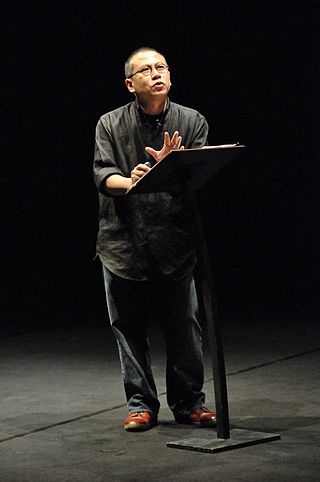
Nirwan Dewanto is an Indonesian poet, curator and cultural critic. He is also known for his depiction of Albertus Soegijapranata in the 2012 biopic Soegija.

KBR is the first independent national radio news agency of Indonesia. It is a unique initiative to assist Indonesia's transition to democracy by facilitating open and informed discussion among millions of people throughout the archipelago. Simply by tuning into their favourite local radio station, millions of Indonesians from across the political, economic and social spectrum can engage in radio debates and, in doing so, influence key issues affecting their lives.
Harian Rakjat was an Indonesian newspaper published by the Communist Party of Indonesia (PKI) from 1951 to 1965. The Harian Rakjat motto was "Untuk rakjat hanya ada satu harian, Harian Rakjat!". Harian Rakyat was managed by Njoto as a member of the editorial board and Mula Naibaho as editor in chief.
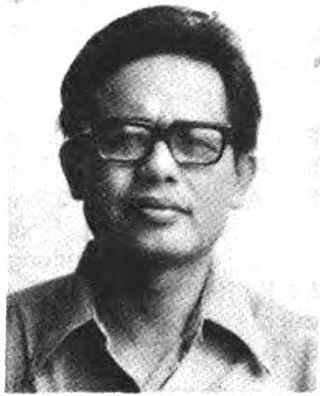
Jakob Oetama was an Indonesian teacher, journalist, and businessman who was one of the co-founders and owners of Kompas Gramedia Group, the largest media group in Indonesia, together with P. K. Ojong. He has served as President Director of Kompas Gramedia, Advisor to the Central Board of the Indonesian Journalists Association, and Advisor to the Association of Southeast Asian Nations Journalists Confederation. He was the recipient of the Honoris causa Doctorate in Communications from Gadjah Mada University and the Mahaputra Utama Star award from President Suharto in 1973.
Censorship in Indonesia has varied since the country declared its independence in 1945. For most of its history the government of Indonesia has not fully allowed free speech and has censored Western movies, books,films, and music as well. However, partly due to the weakness of the state and cultural factors, it has never been a country with full censorship where no critical voices were able to be printed or voiced.
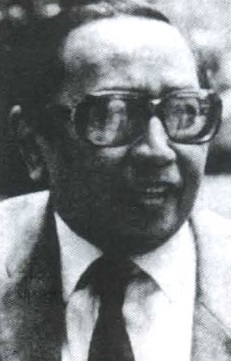
Suardi Tasrif was an Indonesian journalist, writer, and advocate. He became active in journalistic endeavors starting in the Indonesian National Revolution, and led the prominent newspaper Abadi during the Sukarno period since its founding in 1951 until its ban in 1960. He moved into advocacy during the New Order era, lobbying for legal reform in the Suharto regime's early years and becoming a prolific writer on legal and political matters. He has also contributed to the code of ethics of both the journalistic and advocacy professions in Indonesia.
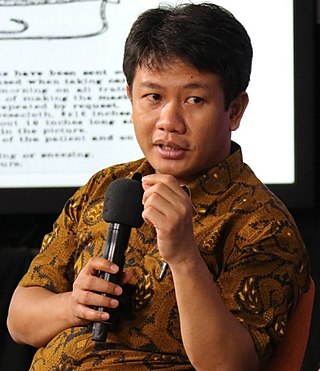
Bonnie Triyana is an Indonesian historian, politician and museum curator. He founded the Indonesian-language history magazine Historia and is its director and editor-in-chief.
















